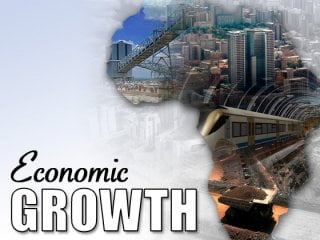After decades in the dark ages the African continent is entering into a renaissance-esque period. It has made humungous leaps in the past decade, several marked in the area of human development. However, before you think of it as the next gold rush, we need to understand if this change is here to stay or just a house of cards waiting to fall.
After all, more than 40% of Africans still live below the poverty line, many of their governments are riddled with corruption, and deadly internal conflicts make up your average day here.
Africa is the world’s fastest-growing continent as of now, showing immense potential of becoming the next economic powerhouse; some economists even say it might be the next China. Over the next decade its GDP is expected to rise by an average of 6% a year, thanks to foreign direct investment(what would our world be without capitalistic economies pumping money into poor 3rd world countries only to later rip us off?), which has risen from $15 billion in 2002 to $46 billion in 2012.
There are two basic reasons this proposition seems promising. Firstly, Africa’s economic environment is much more stable than it was at the turn of the decade. Even by the litmus test of public debt, almost all African countries outperform EU nations: a twist of fate from the turn of the century. A large majority of African countries have experienced strong growth and poverty reduction in the recent times—and they have managed to sustain these results in the present volatile global economic sphere.
Secondly, these stark improvements are only the first manifestations of profound, long-term riches, which have the potential to accelerate and sustain Africa’s development. Since 2000, GDP growth rates have averaged and often exceeded 5% per year and this is not limited to a subset of—poorly governed—resource-rich states. Coastal (Senegal, Mozambique) and land-locked (Burkina Faso) countries, commodity exporters (Zambia, Nigeria) and importers (Ethiopia, Rwanda), low-income (Uganda) and middle income economies (Mauritius, Botswana) have all experienced high levels of growth.
Moreover, economic growth has translated and trickled down into a better standard of living. Poverty rates are falling fast and key social indicators are improving even more rapidly. Despite being a conflict ridden area rampant with diseases, Africans are now living longer than ever before—55 years on average, which is seven years more than a decade ago. More children go to school now and most African countries will likely meet the primary enrolment and gender targets of the Millennium Development Goals 2015, set by the United Nations Development Program. Primary education is no longer a luxury (primary enrolment is almost universal) and the continent will soon be in a position to reap its profits thanks to the rapid expansion of secondary education. Major corporations like Nokia and Google too are scouting the continent in search of business opportunities and human talent.
These gains hinge on the fact that half of the world’s future population growth will be driven by Africa, because of longer life expectancy and greater fertility rates with ample resources to support this newfound asset. This is creating a demographic opportunity because Africa’s adult population is rising rapidly: A phenomenon which explains East Asia’s growth performance over the last three decades.
In addition to this, technology by providing access to education and enabling information dissemination is reshaping Africa’s developmental outlook and policy measures. Today, Africa has more phones per capita due to affordable telecommunication services. Thanks to cell-phones, now better known as Smartphones—which have morphed into multi-purpose devices—Africans can more easily participate in social and political life, especially if they reside in a remote village.
So is this the next thing? Yes; it is just a probability, but what is life without risks? The continent has entered its 2nd decade of sustained growth, and projections show that this momentum will continue.
In fact, the data may well be hiding a rough diamond: this is because African economies are largely informal and therefore hard to measure accurately. Ghana’s recently revised GDP shot upwards by a whopping 60%! Don’t believe me? Happy Googling!

































